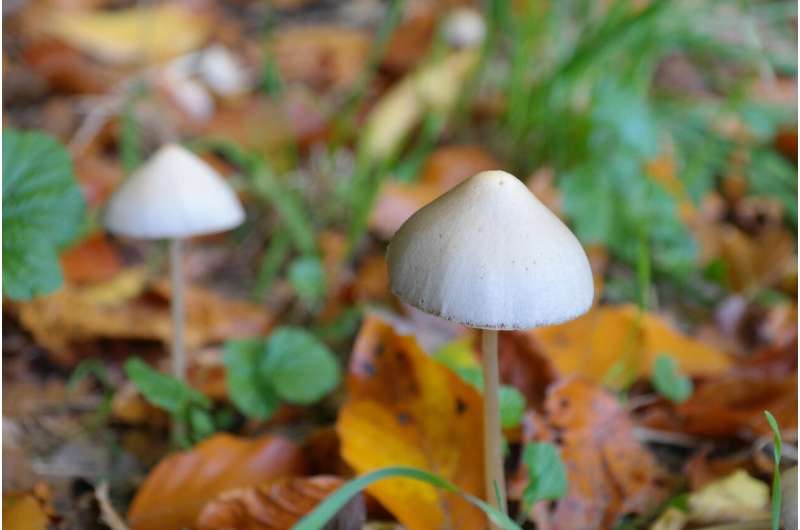This article has been reviewed according to Science X's editorial process and policies. Editors have highlighted the following attributes while ensuring the content's credibility:
fact-checked
reputable news agency
proofread
Indiana Senate committee passes medical psilocybin research bill

An Indiana Senate bill seeking funding for research into medical applications of psilocybin was passed unanimously by the Senate Committee on Health and Provider Services on Wednesday.
Senate Bill 139 would create a therapeutic psilocybin research fund controlled by the Indiana Department of Health, which would provide financial assistance to Indiana research institutions for studying the substance's use in treating mental health and neurological conditions.
Psilocybin is a naturally occurring chemical contained in certain types of fungus commonly called "magic mushrooms." When consumed, it is metabolized in the body to produce the active drug psilocyn, which can produce psychedelic effects, impacting a person's senses and altering their perception of reality.
Used for thousands of years around the world, psilocybin mushrooms gained popularity among the counter culture that emerged in the United States in the mid-20th century. A 1965 law passed by Congress made possession of the substance illegal, and psilocybin is currently categorized under Schedule I of the Controlled Substances Act. The designation, given to drugs with no accepted medical use and a high potential for abuse, is also applied to marijuana and heroin.
Psilocybin's psychiatric applications have garnered increased attention in recent years from researchers and regulators. In June, the U.S. Food and Drug Administration issued its first draft guidance on clinical trials with psychedelic drugs.
Research institutions including New York University, Johns Hopkins and Yale have explored psilocybin's ability to treat an array of conditions and symptoms ranging from depression to substance abuse disorders to cluster headaches, with promising results.
In studies, psilocybin and other psychedelic drugs have shown an ability to promote the growth of new connections between neurons in the brain, a phenomenon known as plasticity.
In November, a report approved at the final meeting of Indiana's interim study committee on Public Health, Behavioral Health and Human Services urged lawmakers to authorize a psilocybin pilot program during the 2024 legislative session.
State Sen. Ed Charbonneau, R-Valparaiso, chaired the study committee and authored SB 139. He said testimony from subject matter experts convinced him that further investment in research is warranted.
"For veterans and folks that deal with serious mental health issues, you want to find things that provide some hope," he told the Post-Tribune. "And this is clearly something that provides, in my mind, some real hope for a treatment."
Several medical experts voiced their support for the legislation during Wednesday's committee hearing. Brandon Weiss, a clinical psychologist at Johns Hopkins, told lawmakers that existing data on psilocybin's health impacts has made him and his colleagues optimistic about its future in medicine.
"At this point in time nearly 50% of U.S. states contain research studies investigating the therapeutic application of psilocybin," he said. "However, research remains relatively limited in most of these states as a result of constraints on funding. Allowing for the creation of a fun that donors in the state can possibly invest in the future holds great potential for medical innovation."
Richard Feldman, a family physician and former Indiana State Health commissioner, noted the potential benefits to depressed patients who do not see improvement from conventional antidepressants and lauded the bill as a "a good conservative initial step in this process."
"Many states are moving to make statutory changes, either to decriminalize, which I think is a bad idea, or even California that's moving to legalize psilocybin, which is a really bad idea," he told the committee.
Last year, California Gov. Gavin Newsom vetoed a bill that would have decriminalized several psychedelic drugs, including psychedelic mushrooms.
Charbonneau stressed that his bill will not change the legal status of psilocybin or make the substance more accessible to recreational users. He drew a sharp distinction between funding psilocybin research and making medical marijuana available to Hoosiers—a policy proposal that has been revived this session by Statehouse Democrats after repeatedly failing in past years.
"This is in no way has anything to do with legalizing marijuana or anything else. We're talking about trials under very controlled settings, not decriminalizing anything," he said. "(Psilocybin) has gone through these rigorous trials and has shown some benefits, and it's really what separates it from the medical marijuana because I'm not sure how much credible research is done on that."
Charbonneau declined to say whether he would vote for a medical marijuana bill.
Because SB 139 deals with funding, it is now headed to the Senate Appropriations Committee, where lawmakers will deliberate on whether and how to fund its provisions. Charbonneau acknowledged that state funds for his legislation might be hard to come by during a non-budget session and after Indiana identified a nearly $1 billion shortcoming in the state's projected biennial Medicaid costs in December.
"We write a two-year budget and we shouldn't be monkeying with that budget in the off year," he said.
2024 Chicago Tribune. Distributed by Tribune Content Agency, LLC.




















